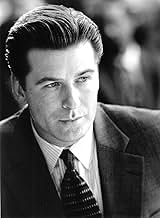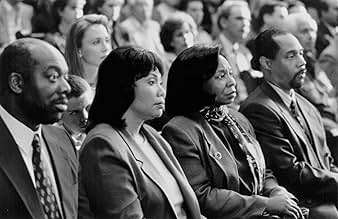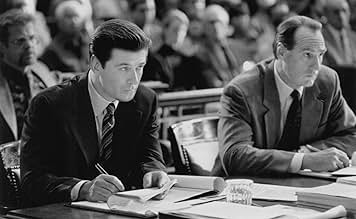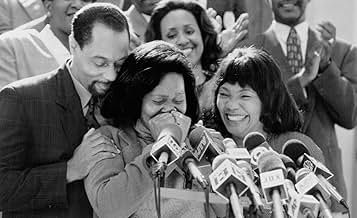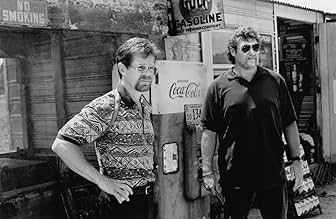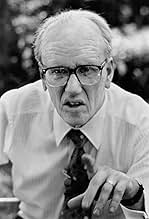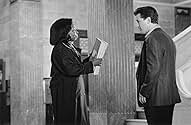NOTE IMDb
6,7/10
13 k
MA NOTE
Ajouter une intrigue dans votre langueA Mississippi district attorney and the widow of Medgar Evers struggle to finally bring a white supremacist to justice for the 1963 murder of the civil rights leader.A Mississippi district attorney and the widow of Medgar Evers struggle to finally bring a white supremacist to justice for the 1963 murder of the civil rights leader.A Mississippi district attorney and the widow of Medgar Evers struggle to finally bring a white supremacist to justice for the 1963 murder of the civil rights leader.
- Nommé pour 2 Oscars
- 2 victoires et 9 nominations au total
Joe Tello
- Drew DeLaughter
- (as Joseph Tello)
Alexa PenaVega
- Claire DeLaughter
- (as Alexa Vega)
Ben Bennett
- Benny Bennett
- (as Lloyd 'Benny' Bennett)
Avis à la une
THIS FILM IS BASED ON A TRUE STORY. Not only was the real Myrlie Evers consulted while making the film, two of her and Medgar's sons were actually in the film, playing themselves. Benny Bennett also played himself.
It was based on a actual (although little known) event in American history, and shows how there are still conflicts over civil rights today. We also learn that there are still some people in the Southern U.S. that are opposed to laws that have been in place for over 35 years.
So while watching this you shouldn't think "the story is cliche" or "the acting was good, but predictable," you should be thinking that this actually happened, and reflecting on how far we've come as a society, and how far we still need to go.
It was based on a actual (although little known) event in American history, and shows how there are still conflicts over civil rights today. We also learn that there are still some people in the Southern U.S. that are opposed to laws that have been in place for over 35 years.
So while watching this you shouldn't think "the story is cliche" or "the acting was good, but predictable," you should be thinking that this actually happened, and reflecting on how far we've come as a society, and how far we still need to go.
Impressive drama about the assassination of 1960's civil rights leader Medger Evers, which was fought in courts for 30 years until it was re-opened in the 1990's with Mississippi D.A. Bobby DeLaughter (Baldwin) leading the charge to bring assassin Byron De Lay Beckwith (Woods, in a juicy Oscar nominated role) to justice. Goldberg is especially standout as Ever's widow who fought for the truth for over 30 years. Rob Reiner's film may run a little long for some, but the excellent cast and realistic story will keep you glued until the end.
Medgar Evers' tragic murder in Jackson, Mississippi, was overshadowed by the cold-blooded killing of three civil rights workers near Philadelphia, Mississippi, a year later. So too this film has been overshadowed by an earlier movie, "Mississippi Burning," about the Philadelphia homicides. I was even confused by the similar titles and accidentally rented "Ghosts of Mississippi," thinking it to be the earlier film. This is too bad because "Ghosts of Mississippi" is a winner all the way and Medgar Evers' assassination was as significant, if not more so, than the later dastardly acts of hate and malevolence.
Most of my generation remember one of Dylan's early recordings he wrote called "Pawn in the Game" about the Medgar Evers murder in which Dylan asserts that the coward who pulled the trigger and shot the civil rights leader in the back in front of his wife and three children was carrying out what the racist elements in Mississippi and in the nation as a whole had brainwashed the simple mind into executing. That the endemic racism in American was the real perpetrator of the heinous deed which deprived our society of one of its gifted leaders. "Ghosts of Mississippi" concentrates more on the scumbag who squeezed the trigger, played with élan by James Woods, almost a carbon copy of the killer in both speech, mannerisms, and looks.
James Woods is a member of a strong cast led by Whoopi Goldberg as the widow, Myrlie Evers, spending her life seeking a degree of justice for her husband and children. William H. Macy adds much needed humor in the role of Charlie Crisco, a member of the prosecution team. Unfortunately, his part is mainly limited to the middle section of the movie. Why director Rob Reiner and writer Lewis Colick decided to turn Macy's character into a cameo during the latter part of the film is unclear.
A subplot in the film is the growing involvement of prosecutor Bobby DeLaughter (Alec Baldwin) in the case, opening his eyes not only to the past evils of the society in which he lives but also hostile residue left by the civil rights movement in the state. Married to the daughter of one of Mississippi's most racist judges causes him to be blind to much of the injustice prevalent around him. Significantly, his wife is named Dixie (Virginia Madsen). The change that takes place in his character (which also involves a change in wives) as he is drawn deeper into the thirty-year-old case is pinpointed by his inability to continue to sing "Dixie" to his daughter to chase away the ghosts she sees at night. In explaining to her that the song might actually be encouraging the ghosts to reappear in her bedroom, the two opt for "Old McDonald" as a more suitable goodnight song.
Most of my generation remember one of Dylan's early recordings he wrote called "Pawn in the Game" about the Medgar Evers murder in which Dylan asserts that the coward who pulled the trigger and shot the civil rights leader in the back in front of his wife and three children was carrying out what the racist elements in Mississippi and in the nation as a whole had brainwashed the simple mind into executing. That the endemic racism in American was the real perpetrator of the heinous deed which deprived our society of one of its gifted leaders. "Ghosts of Mississippi" concentrates more on the scumbag who squeezed the trigger, played with élan by James Woods, almost a carbon copy of the killer in both speech, mannerisms, and looks.
James Woods is a member of a strong cast led by Whoopi Goldberg as the widow, Myrlie Evers, spending her life seeking a degree of justice for her husband and children. William H. Macy adds much needed humor in the role of Charlie Crisco, a member of the prosecution team. Unfortunately, his part is mainly limited to the middle section of the movie. Why director Rob Reiner and writer Lewis Colick decided to turn Macy's character into a cameo during the latter part of the film is unclear.
A subplot in the film is the growing involvement of prosecutor Bobby DeLaughter (Alec Baldwin) in the case, opening his eyes not only to the past evils of the society in which he lives but also hostile residue left by the civil rights movement in the state. Married to the daughter of one of Mississippi's most racist judges causes him to be blind to much of the injustice prevalent around him. Significantly, his wife is named Dixie (Virginia Madsen). The change that takes place in his character (which also involves a change in wives) as he is drawn deeper into the thirty-year-old case is pinpointed by his inability to continue to sing "Dixie" to his daughter to chase away the ghosts she sees at night. In explaining to her that the song might actually be encouraging the ghosts to reappear in her bedroom, the two opt for "Old McDonald" as a more suitable goodnight song.
It may not be the best film about race relations in the South. Mississippi Burning and A Time To Kill have more intensity, but it is still compelling and worth watching for some great performances.
Alec Balwin (Bobby DeLaughter) turned in a fine performance. Personally, I feel it is the best he has ever done.
James Woods was perfect as Byron De La Beckwith. He channeled the venomous hatred and cocky arrogance so familiar in those who were consumed with their self-worth, gained by stomping on others. This performance resulted in an Oscar nomination in a year with many fine performances.
Dixie DeLaughter, played by Virginia Madsen, shows how ingrained racism is in the South, and how difficult, if not impossible, it is for a marriage to survive with a disparity in views, whether it be race or politics.
I also enjoyed seeing Wayne Rogers as Morris Dees, even if it was a small role.
This is an important film that should be seen by all who care about the state of race relations in this country.
It should also be see by all young people so they can see a sign at a gas station saying 22 cents a gallon. Those were the days.
Alec Balwin (Bobby DeLaughter) turned in a fine performance. Personally, I feel it is the best he has ever done.
James Woods was perfect as Byron De La Beckwith. He channeled the venomous hatred and cocky arrogance so familiar in those who were consumed with their self-worth, gained by stomping on others. This performance resulted in an Oscar nomination in a year with many fine performances.
Dixie DeLaughter, played by Virginia Madsen, shows how ingrained racism is in the South, and how difficult, if not impossible, it is for a marriage to survive with a disparity in views, whether it be race or politics.
I also enjoyed seeing Wayne Rogers as Morris Dees, even if it was a small role.
This is an important film that should be seen by all who care about the state of race relations in this country.
It should also be see by all young people so they can see a sign at a gas station saying 22 cents a gallon. Those were the days.
Glossy but highly effective thriller based on the true story of an attempt to bring a racially motivated killer to trial. The film suffers from a certain liberal obviousness: brave, charming white man (who loves his kids) and dignified black widow fight side by side for justice; but it's always compelling, and pertinent too. No magic, then, but a strong story: one of director Rob Reiner's better efforts.
Le saviez-vous
- AnecdotesYolanda King, the daughter of civil rights activist Martin Luther King, portrayed Medgar Evers' daughter Reena Evers in this film.
- GaffesWhen DeLaughter and his investigators drive up to a gas station, the prices for gas are all under a dollar. When DeLaughter is on the phone to Myrlie Evers standing on the other side of the signs, the prices are all now over a dollar.
- Citations
Myrlie Evers: [quoting Medgar Evers] When you hate, the only person who suffers is you, because most of the people you hate don't know it and the others don't care.
- Bandes originalesI Wish I Knew How It Would Feel to Be Free
Music by Billy Taylor
Lyrics by Billy Taylor and Dick Dallas
Performed by Dionne Farris
Courtesy of Columbia Records
By Arrangement with Sony Music Licensing
Meilleurs choix
Connectez-vous pour évaluer et suivre la liste de favoris afin de recevoir des recommandations personnalisées
- How long is Ghosts of Mississippi?Alimenté par Alexa
Détails
- Date de sortie
- Pays d’origine
- Langue
- Aussi connu sous le nom de
- Ghosts of Mississippi
- Lieux de tournage
- Sociétés de production
- Voir plus de crédits d'entreprise sur IMDbPro
Box-office
- Budget
- 36 000 000 $US (estimé)
- Montant brut aux États-Unis et au Canada
- 13 323 144 $US
- Week-end de sortie aux États-Unis et au Canada
- 168 012 $US
- 22 déc. 1996
- Montant brut mondial
- 13 323 144 $US
- Durée2 heures 10 minutes
- Couleur
- Mixage
- Rapport de forme
- 1.85 : 1
Contribuer à cette page
Suggérer une modification ou ajouter du contenu manquant


